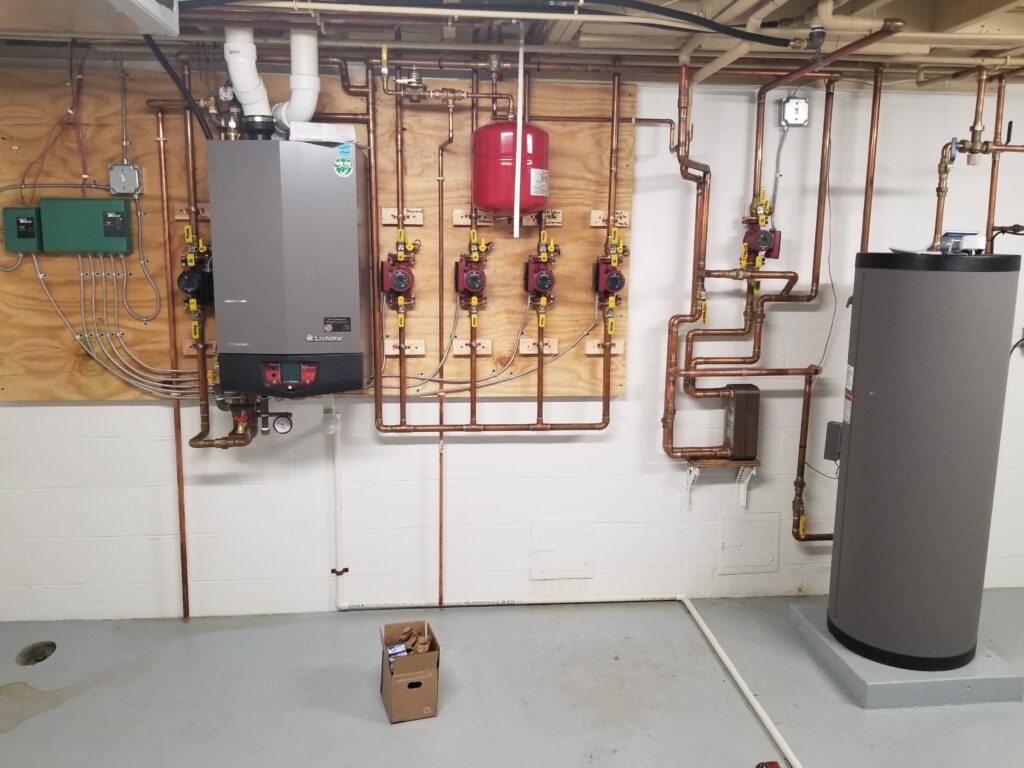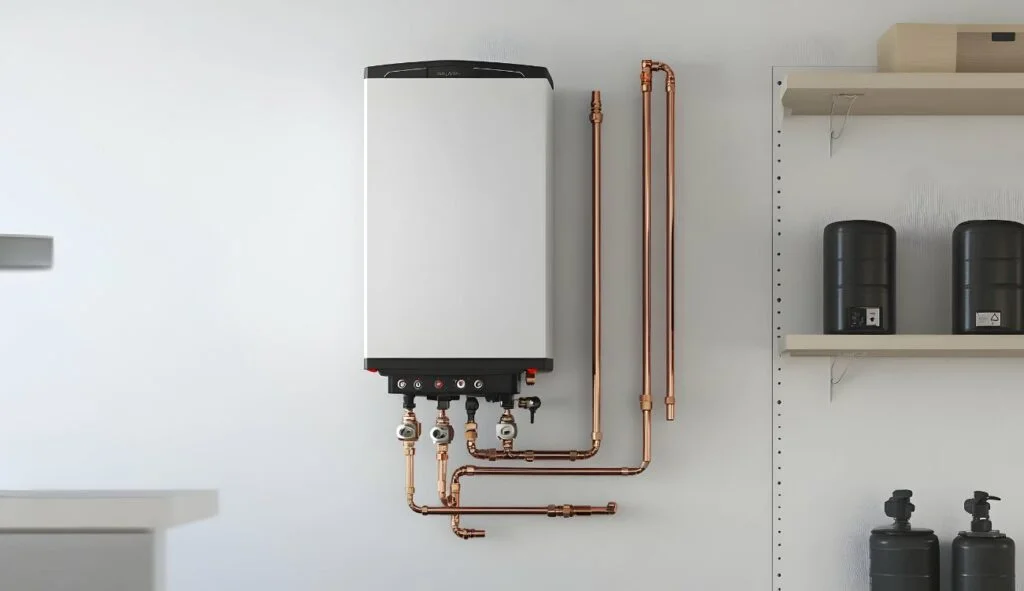Boiler shopping can feel overwhelming. Terms like “condensing” and “combi” are often used together, but they don’t mean the same thing.
For Rhode Island homeowners, this choice is important. Harsh winters demand reliable heating, and your decision affects both comfort and energy bills.
This guide explains condenser boiler vs combi boiler clearly, so you know which option fits your home best.
What Is a Condenser Boiler vs a Combi Boiler?
A condensing boiler uses flue gases to recover heat and boost efficiency, while a combi boiler combines heating and hot water in one system. Many modern combi boilers are also condensing, but the two terms describe different features.
Key Takeaways
- A condensing boiler recovers heat from exhaust gases, making it far more efficient than older systems.
- A combi boiler combines heating and hot water in one compact unit, saving space.
- Most combi boilers today are also condensing, but their functions differ.
- Rhode Island homeowners should decide based on household size, hot water demand, and space.
- Acorn Oil provides expert boiler installation and advice across Rhode Island.
What Is a Condensing Boiler?

A condensing boiler is designed to capture energy that older systems waste. By recovering heat from exhaust gases, it achieves efficiency ratings of 90% or more.
This technology became standard in the U.S. and Europe because it lowers fuel consumption and reduces carbon emissions.
A proper installation — complete with a condensate drain — is the only real requirement. With professional boiler repair in Marion and the right setup, a condensing boiler can deliver steady heat while minimizing energy waste.
What Is a Combi Boiler?
A combi, or combination boiler, delivers both central heating and hot water from one compact unit. Instead of storing water in a cylinder, it heats water instantly when a tap or shower is turned on.
This setup makes it ideal for smaller homes, condos, or apartments where space is limited. It’s efficient, convenient, and eliminates the need for bulky storage tanks.
The trade-off is flow rate. If multiple taps or showers are running at once, water pressure can drop. That’s why larger households often need a system with a hot water tank.
How Are They Similar?
Here’s where the overlap begins. Most modern combi boilers are also condensing, which means they deliver both instant hot water and high efficiency.
Both types are designed to reduce fuel waste, improve safety, and provide reliable heating. Whether you choose a combi or a traditional system, condensing technology is now the norm.
Key Differences Between Condenser Boiler vs Combi Boiler
Condensing Boiler: Efficiency over 90% using flue gas recovery, uses a separate tank or cylinder for hot water, larger footprint, handles multiple outlets better, best for larger homes with high water demand.
Combi Boiler: Usually condensing as well, provides hot water on demand with no tank, compact and wall-mounted, limited if several taps run at once, best for smaller homes with limited space.
In short, condensing is about efficiency, and combi is about function. A combi boiler can also be condensing, but not all condensing boilers are combi systems — a distinction worth keeping in mind when considering boiler replacement and installation in Cranston.
Which One Is Right for Rhode Island Homes?
Rhode Island winters are long and cold, so efficiency should be a top priority.
For smaller homes or apartments, a combi boiler is often the perfect choice. It saves space and delivers hot water instantly without extra equipment.
For larger homes or families with multiple bathrooms, a condensing boiler paired with a tank ensures steady hot water during peak use. Working with a local expert like Acorn Oil helps you choose the system that matches your needs.
Maintenance, Efficiency & Regulations

No matter which boiler you choose, regular maintenance is essential. Annual servicing keeps efficiency high and ensures safety.
Condensing boilers often achieve AFUE (Annual Fuel Utilization Efficiency) ratings above 90%. That means more heat from less fuel.
Rhode Island homeowners may also qualify for energy incentives when upgrading to high-efficiency boilers, making replacement an even smarter move.
Case Study: A Rhode Island Example
A family in Warwick had an older, inefficient boiler that struggled during cold spells. With two bathrooms and teenagers using showers at the same time, hot water frequently ran out.
They considered a combi boiler but worried about flow rates. After consulting with Acorn Oil, they chose a condensing boiler with a hot water tank.
The result: steady heating, reliable hot water, and noticeably lower fuel bills throughout the winter.
Frequently Asked Questions
1. What’s the difference between condensing and non-condensing boilers?
Condensing boilers recycle heat from exhaust gases. Non-condensing models waste that energy.
2. Can a combi boiler also be condensing?
Yes. Most modern combi boilers are condensing.
3. Are combi boilers good for large homes?
Not usually. Larger households often need a system with a tank.
4. Will a condensing boiler reduce my bills?
Yes. By using more heat from the same fuel, you save money.
5. Do boilers need yearly servicing?
Absolutely. Annual service keeps your system safe and efficient.
6. Is a combi boiler easier to install?
Often, it doesn’t need a separate tank or cylinder.
Conclusion
Condensing boilers focus on efficiency, while combi boilers focus on convenience and space savings. Many modern systems combine both features, but the right choice depends on your home and family’s hot water demand.
For Rhode Island homeowners, professional guidance ensures you pick the right system and enjoy reliable heating all winter.